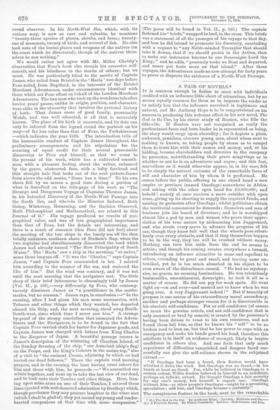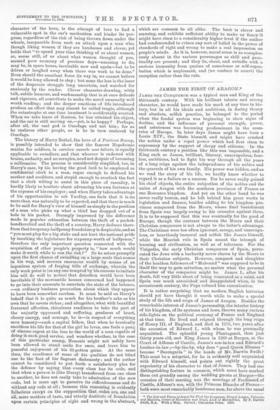A PAIR OP NOVELS.* IT is common enough in fiction
to meet with individuals credited with an influence little short of miraculous, but by no means equally common for them so to impress the reader as to satisfy him that the influence exercised is legitimate and natural, and Mr. Anthony Hope is to be congratulated on his success in producing this welcome effect in his new novel, The God in the Car, by his clever study of Ruston, who fills the title-role. If Ruston were not recognised as really the predominant force and born leader be is represented as being, the story would verge upon absurdity ; for it depicts a plain, awkward, penniless, obscure young man, about whom next to nothing is known, so taking people by storm as to compel them to trust him with their names and money, and, at his bidding, become shareholders and directors in the company he promotes, notwithstanding their grave misgivings as to whether or not he is an adventurer and rogue; and this feat, marvellous as it would otherwise appear, is, in his case, felt to be simply the natural outcome of the remarkable force of will and character of him by whom it is performed. He comes before the public, offering in one closed hand a new empire or province (named Omofaga) somewhere in Africa, and asking with the other open hand for 23,000,000; and behold I society at once receives a mere outsider with open arms, giving up its shooting to supply the required funds, and naming its garments after Omofaga ; whilst politicians obtain the territorial concessions he demands ; financiers and men of business join his board of directors ; and he is worshipped almost like a god by men and women who prove their appre- ciation of his true nature by nicknaming him Juggernaut, and who strain every nerve to advance the progress of his car, though they know full well that the wheels pass relent. lessly over every obstacle, and that if they themselves happen to be in the way, they too will be crushed without mercy. Nothing can turn him aside from the end. he means to attain; and though his coming creates everywhere a turmoil, introducing an influence attractive to some and repellent to others, extending to great and small, and leaving none un- touched, yet he is too much absorbed in his object to be even aware of the disturbance caused. "He had no mystery- airs, no graces, no seeming fascinations. He was relentlessly businesslike, unsentimental, downright; he took it all as a matter of course. He did not pry for weak spots. He went right on—on and over—and seemed not to know when he was going over. A very Juggernaut indeed !" Bat if tenacity of purpose is one source of his extraordinary moral ascendency, another and perhaps stronger reason for it is discoverable in his absolute self-confidence. For as self.confidence (of course we mean the genuine article, and not self-confidence that is only assumed or bred by conceit) is created by the possessor's having been driven to trust to his own resources, and not found them fail him, so that he knows his " self " to be no broken reed to lean on, but that he has power to cope with an emergency and make his hands guard his head, therefore this attribute is in tteelf an evidence of strength likely to inspire confidence in others also. And one feels that only much experience of difficulties vanquished and dangers faced suc- cessfully can give the self-reliance shown. in the subjoined extract :— "If Omofaga had been a fraud, then Ruston would have whistled it down the wind. But Omofaga was no fraud,—in his hands at least no fraud. For, while he believed in Omofaga to a certain extent, Willie Ruston believed in himself to an indefinite, perhaps an infinite, extent. He thought Omofaga a fair security for any one's money, but himself a superb one. Onic!fa. go without him—or other people's Omofagas—might be a promising speculation ; add him, and Omofago became a certainty."
The conspicuous feature in the book, next to the remarkable * (1.) The God in the Carr. By Anthony Hope. London : Methuen and Co, (2.) A Precious scamp. By Henry oressweu. London: Ilntohinson and Son. character of the hero, is the attempt of love to find a vulnerable spot in the car's mechanism and hinder its pro- gress, regardless of the risk of being thrown down under the wheels, inseparable from such an attack upon a man who, though liking women if they are handsome and clever, yet holds that "to spend your time thinking of or about women, or, worse still, of or about what women thought of you, seemed poor economy of precious days—amusing to do, may be, in spare hours, inevitable now and again—but to be driven or laughed away when there was work to be done." Even should the assailant force its way in, we cannot believe it would be long allowed to stay ; but none the less is the issue of the desperate struggle long uncertain, and watched for anxiously by the reader. Clever character-drawing, witty talk, subtle humour, and workmanship that is at once delicate and vigorous, all contribute to make the novel unusually well worth reading; and the deeper emotions of life introduced produce an effect that may almost be called tragic, although the catastrophe at one time imminent is accidentally averted. When we take leave of Ruston, he has attained his object, and the oar is still moving on,—yet, is he happy P Perhaps, after all, the real god is Omofaga and not him ; for as he enslaves other people, so is he in turn enslaved by Omofaga,.
The history of Harry Bethel, the hero of A Precious Scamp, is possibly intended to show that the famous Napoleonic maxim for soldiers, la carrare muerte aux talents, is equally applicable to swindlers, and that whoever is endowed with brains, audacity, and no scruples, need not despair of becoming a millionaire. The process is considerably simplified, too, in Harry's ease, by his having the good luck to be employed as confidential clerk to a man, rogue enough to defraud his mother and creditors, and stupid enough to overlook the fact that a clerk willing to assist in this piece of rascality, is hardly likely to hesitate about advancing his own fortunes at the expense of his employer; and when Harry takes advantage of his opportunities to rob Yardley, one feels that it is no more than was naturally to be expected, and that there is much to be said for Harry's view of himself as simply in the position of a man who picks up what a thief has dropped out of a hole in his pocket. Strongly impressed by the difference Suede in popular estimation between the theft of a pocket- handkerchief and the theft of a country, Harry deduces there- from that twopenny-halfpenny fraudulency is despicable, and as "you must play for a big stake and not hurt the national pride by insulting the legislature for sixpenny-worth of halfpence," therefore the only important question connected with the acquisition of other people's property is, how much would make it worth while to run the risk P" So he seizes promptly upon the first chance of swindling on a large scale that comes in his way, and secures enormous wealth by means of an ingenious system of forging bills of exchange, wherein the only weak point is (as any one tempted by his success to imitate him will do well to notice) that detection would have been inevitable if the mercantile houses concerned had happened to go into their accounts to ascertain the state of the balance, —an ordinary business precaution about which they appear to have been somewhat careless. It must be said on Harry's behalf that it is quite as much for his brother's sake as his own that he covets riches ; and altogether, what with beautiful fraternal affection, chivalrous readiness to take the part of the unjustly oppressed and suffering, goodness of heart, cheery energy, and courage, he is—in respect of everything save honesty—such a capital fellow, that when he heroically sacrifices his life for that of the girl he loves, one feels a pang of sincere regret at the loss to the world of a man capable of doing it such good service, and wonders whether, in the case of this particular scamp, Nemesis might not safely have been allowed to stand aside for once, and leave him to peaceful enjoyment of his ill-gotten gains. At the same time, the excellence of some of his qualities do not blind one to the fact of his flagrant dishonesty ; and the author cannot be considered to put forth a satisfactory plea for the defence by saying that every class has its code, and that when a person is (like Harry) transferred from one class to another, he does not easily take to admiration of the new code, but is more apt to perceive its ridiculousness and do without any code at all; because this reasoning is evidently fallacious except on the supposition that codes are, one and all, mere matters of taste, and utterly destitute of foundation upon certain principles of right and wrong in the abstreet, which are common to all alike. The book is clever and amusing, and exhibits sufficient ability to make us fancy it might have risen to a considerably higher level if the author had condescended to evince any sort of belief in the power of standards of right and wrong to make a real impression on people's minds. As it is, however, moral sense is as conspicu- ously absent in the various personages as skill and prac- ticality are present; and they lie, cheat, and swindle with a curious immunity from qualms of conscience or self-repro. bation which is unpleasant, and (we venture to assert) the exception rather than the rule.



















































 Previous page
Previous page